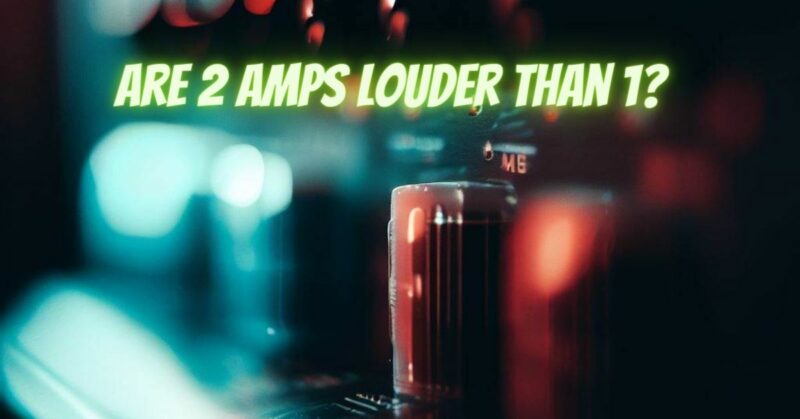The question of whether using two amplifiers (amps) is louder than just one is a common misconception in the world of audio. While it may seem intuitive that doubling the amplification power should result in a significant volume increase, the reality is more nuanced. In this article, we will explore the factors that influence the perceived loudness of multiple amplifiers and why having two amps doesn’t necessarily mean you’ll get a louder sound.
Understanding Amplification Power
Amplifiers are electronic devices that increase the power or amplitude of an audio signal. They play a crucial role in driving speakers and making sound audible to our ears. Amplification power is typically measured in watts (W), and it’s essential to grasp how this power relates to perceived loudness.
The Relationship Between Power and Loudness
The relationship between amplification power and perceived loudness is not linear; it follows a logarithmic scale. This phenomenon is known as the decibel (dB) scale. To put it simply, a doubling of power (for example, going from 100 watts to 200 watts) does not result in a doubling of perceived loudness.
In fact, it takes roughly a tenfold increase in power (a tenfold increase in watts) to produce a perceived doubling of loudness, according to the logarithmic nature of the decibel scale. This means that going from 10 watts to 100 watts may sound twice as loud, but going from 100 watts to 200 watts may not be as noticeable.
Factors Influencing Perceived Loudness:
- Speaker Efficiency: The efficiency of your speakers plays a significant role in determining how loud your system can get. More efficient speakers convert a higher percentage of amplifier power into acoustic energy, resulting in greater perceived loudness. Inefficient speakers may require more power to achieve the same loudness.
- Room Acoustics: The acoustics of the room in which you’re listening can also affect perceived loudness. A well-treated room with sound-absorbing materials can enhance sound quality and allow you to perceive lower volumes as louder.
- Listener Distance: The distance between the listener and the speakers matters. The further you are from the speakers, the louder you’ll need the sound to be to achieve the same perceived loudness.
Using Two Amps: Does It Make It Louder?
Now, let’s address the question of whether using two amplifiers in tandem will result in a significantly louder sound. In most cases, the answer is no, for several reasons:
- Doubling Power Doesn’t Double Loudness: As mentioned earlier, doubling the amplification power doesn’t result in a doubling of perceived loudness. To achieve a substantial volume increase, you’d need a tenfold increase in power.
- Efficiency and Matching: Using two amps simultaneously can be challenging because it requires proper matching of the amplifiers to the speakers. Mismatched amps and speakers can lead to distortion or inefficient use of power.
- Sound Reinforcement: In professional sound reinforcement setups, using multiple amplifiers is more about distributing the load and ensuring system reliability rather than aiming for increased loudness.
While the idea of using two amplifiers to achieve a significantly louder sound is enticing, it’s essential to understand the relationship between amplification power and perceived loudness. Doubling the power doesn’t necessarily double the loudness due to the logarithmic nature of the decibel scale. Instead of focusing on adding more amplifiers, it’s often more effective to invest in higher-efficiency speakers, optimize room acoustics, and consider listener distance to achieve the desired loudness in your audio system. Properly matched and configured equipment and attention to these factors can result in a more satisfying and impactful listening experience.


